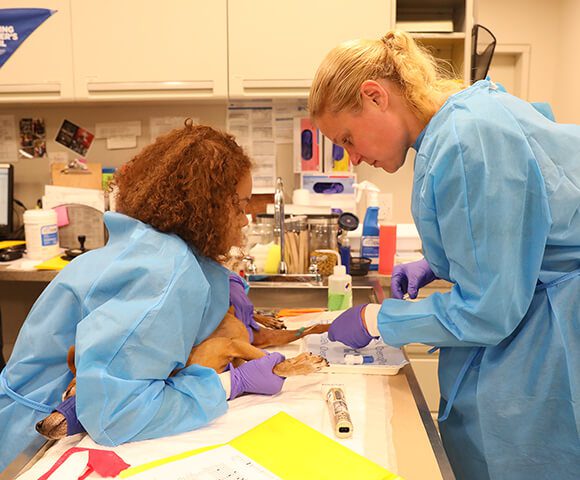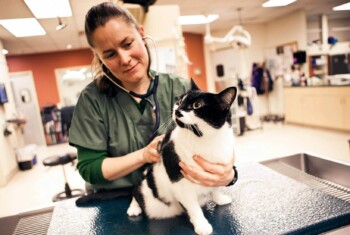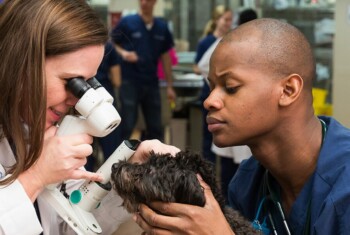Kitten Diarrhea: Common Causes, Symptoms and Treatment
Like human babies, kittens can be sensitive to sudden changes in environment or diet. They can even suffer from food allergies. These factors can cause diarrhea, a condition in which the kitten will release frequent, liquidy stools. If you notice loose stools, you should monitor their bowel movements to make sure the condition is not chronic or a sign of a more serious problem.
When it comes to kitten diarrhea, it could be just a reaction to new foods, but it could also be a sign of a more serious, underlying illness.
If your kitten suffers from diarrhea, it’s not time to panic. Dr. Erick Mears, a BluePearl veterinary specialist board certified in internal medicine, points out that kitten diarrhea is usually a treatable condition. “It’s pretty common and tends to be very responsive to treatment. Most of the time the things you look for are dietary causes or parasites,” he says.
Dietary Causes of Kitten Diarrhea
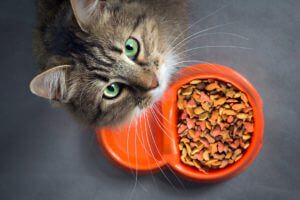
- Cow’s Milk
Cow’s milk is a prime cause of kitten diarrhea because kittens can’t digest it. “Milk is probably the most common thing that people give to kittens that causes diarrhea. Everyone thinks that’s what they need, but it’s not. It will affect them very quickly,” says Dr. Mears.
So nix the milk! Instead, after weaning (at 4-6 weeks), use a kitten milk replacer mixed with kitten food. By 6 weeks of age, kittens can be fed dry and canned kitten food.
- New Diet
When adopting a kitten, it’s a good idea to ask about their current eating habits. To avoid the potential for intestinal issues, you can either continue to feed your kitten the same diet or gradually introduce your preferred food over several days. Before switching cat food, consult your veterinarian and make the change gradually. Mix a little more of the new food in with the old food each time. This will allow your kitten’s sensitive stomach to adapt to the new food slowly.
Then, keep an eye on that litter box. If you can’t learn what your kitten’s diet was before bringing her home, ask your veterinarian to suggest a diet to give your kitten a great start in its new home.
- Food Allergies
Food allergies, overfeeding, or eating inedible items can also cause diarrhea in kittens. Items like bones, fabrics, or kitty litter can create intestinal blockages if swallowed.
While a poor diet is one of the most common reasons kittens suffer from diarrhea, there are other possible causes to consider.
Other Causes of Kitten Diarrhea
- Internal Parasites
Parasites such as roundworms and tapeworms can upset your kitten’s digestion and stunt their growth. Your kitten should be dewormed at two weeks of age and again at two-week intervals until they reach 12 weeks. After that, kittens should be placed on a monthly anti-parasite product prescribed by a family veterinarian. This preventative treatment helps control intestinal parasites and fleas, which cause tapeworms.
- Infections
Common bacterial infections include salmonella and campylobacter. Kittens can contract viruses such as feline immunodeficiency virus, panleukopenia, feline leukemia virus and rotavirus.
- Environmental Stress
Moving to a new home, getting new housemates (animal or human) and other environmental factors can cause diarrhea in kittens.
Watch for These Symptoms
Since diarrhea is a symptom rather than a disease, it can be difficult to determine whether your pet’s condition is serious or temporary.
In cases where diarrhea is combined with any of the symptoms listed below, you should seek immediate veterinary care:
- Blood in stool
- Fever
- Loss of appetite
- Dehydration
- Lethargy
- Vomiting
- Pain
- Frothy/foul-smelling stool
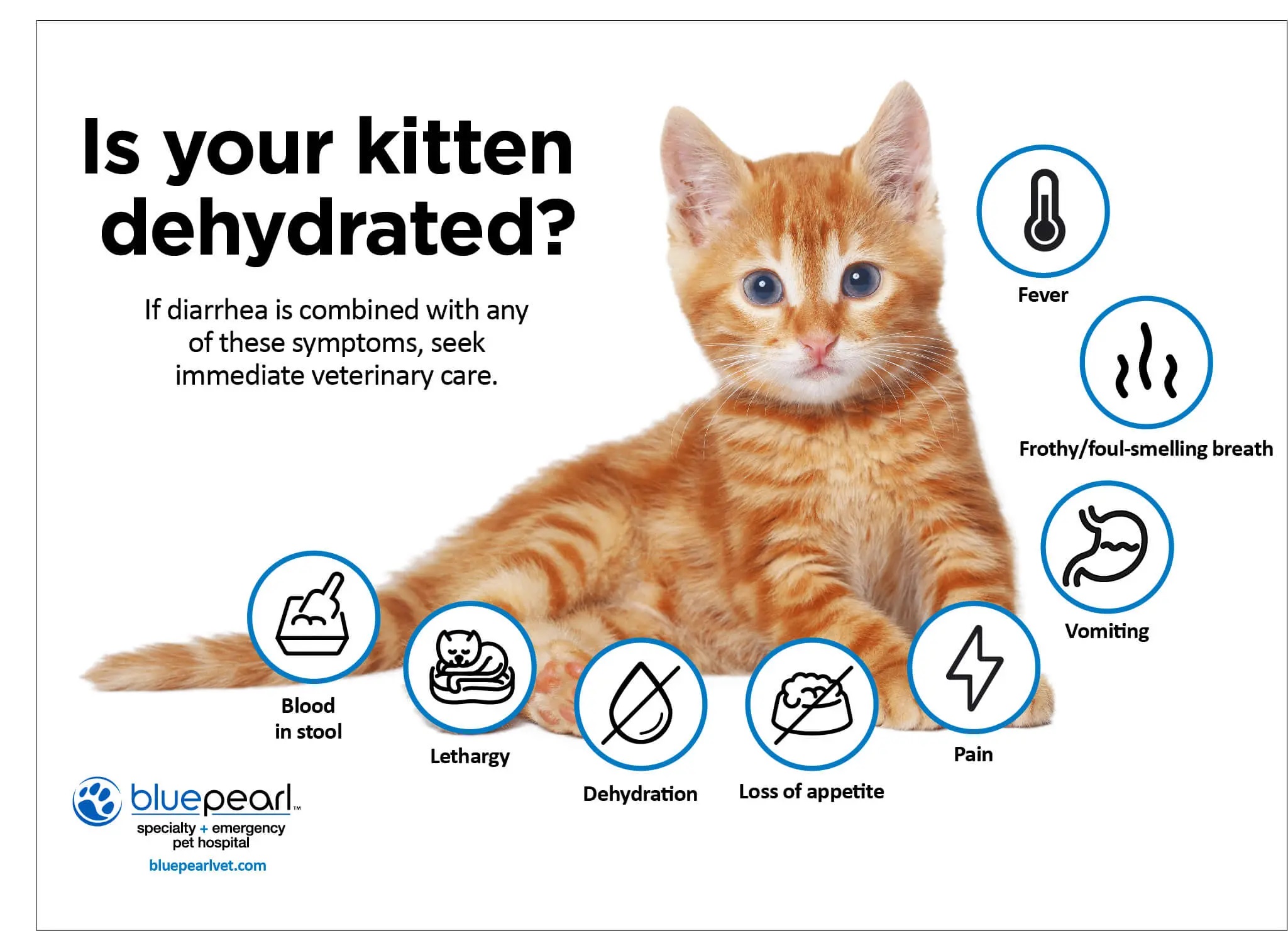
If there are no secondary symptoms, Dr. Mears suggests monitoring your kitten for a while and not panicking. “If they’re on a consistent diet without milk or treats, but they’re still having diarrhea lasting longer than one to two weeks, or if there is weight loss or vomiting, your kitten should see a vet.”
Veterinary Tests
In cases where the cause is unclear, your veterinarian can perform a number of tests in order to determine the source of your pet’s condition, including fecal examinations, blood tests, urinalysis and X-rays that can reveal intestinal blockages. While a simple fasting period of 24 hours or less may be enough to treat some cases, pets suffering from severe dehydration may need a short hospital stay.
Modern veterinary science makes it easier to pinpoint the causes of digestive issues in kittens. PCR testing (a fecal test that amplifies trace amounts of DNA) can look for specific parasitic genetic material in fecal matter to pinpoint sensitive infections.
Avoiding Kitten Diarrhea
It’s best to prevent diarrhea by providing a consistent, nutritious diet for your kitten and keeping them in a clean environment. Taking your new kitten to your family veterinarian within two to three days of bringing her home is another great step. A full examination that includes a fecal examination and de-worming, if needed, can help prevent some of the most common non-dietary issues.
If your kitten does get diarrhea and you want to try a home remedy, you can try adding a little canned pumpkin to their food. The pumpkin increases the fiber in their diet and can balance out their GI tract. A powdered fiber supplement can also be mixed into their food. However, don’t be surprised if your kitten refuses to eat any new additions as felines can be finicky when it comes to their food.
If your new bundle of fur is suffering from diarrhea and you suspect that it could be a sign of a more serious problem, call your veterinarian. If your family veterinarian is closed, contact one of our 24 hour BluePearl pet hospitals.
